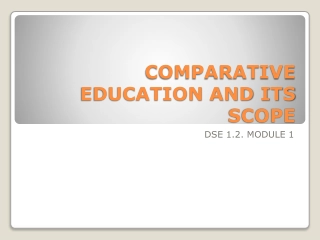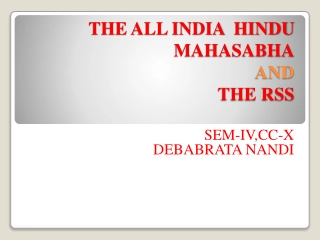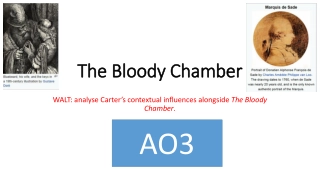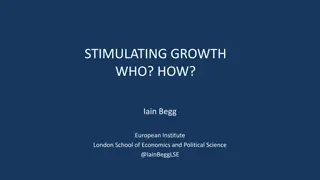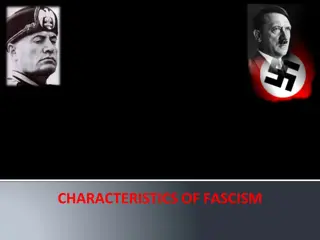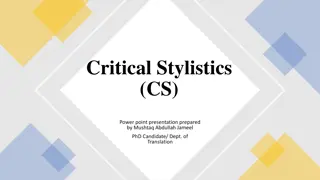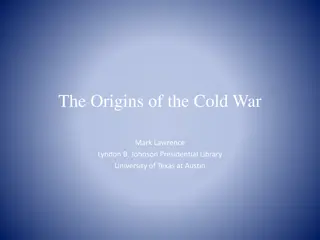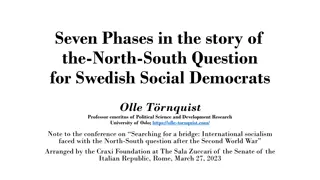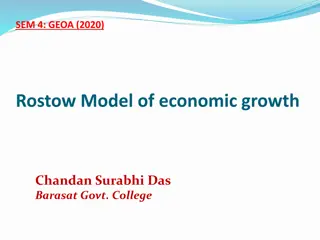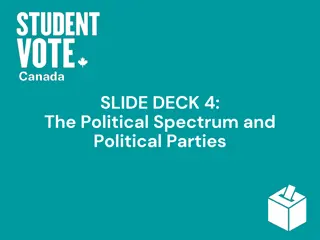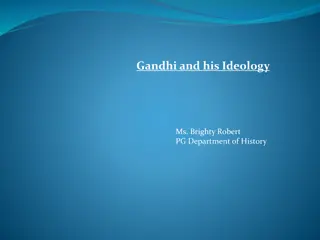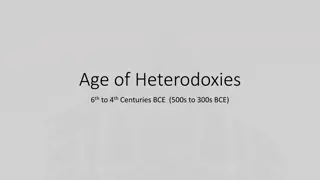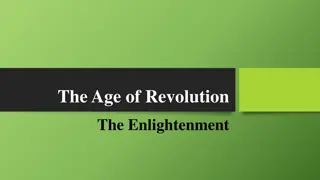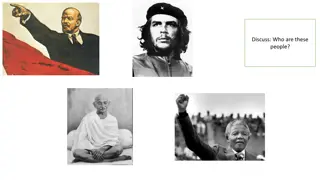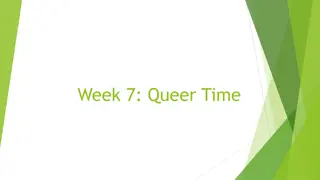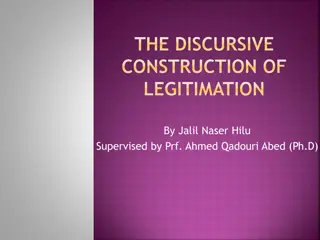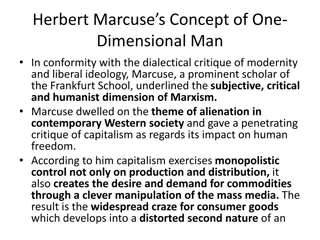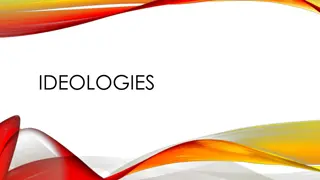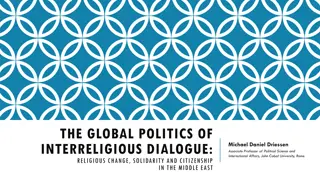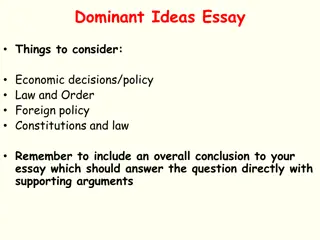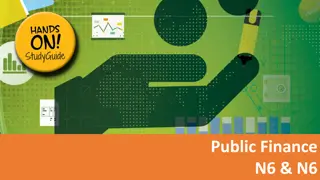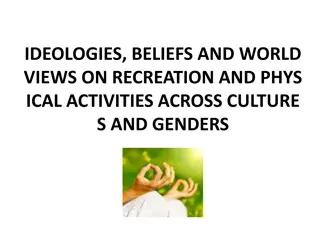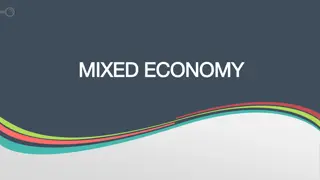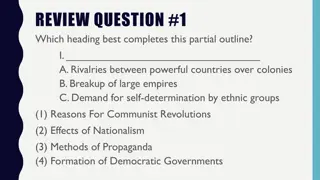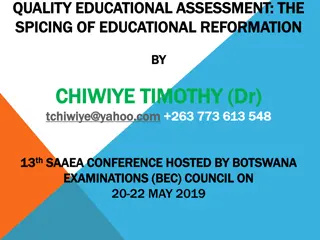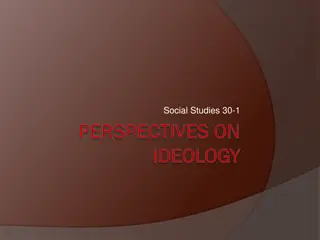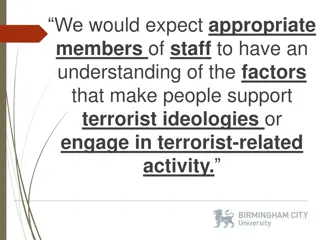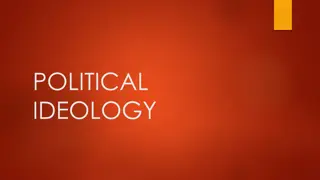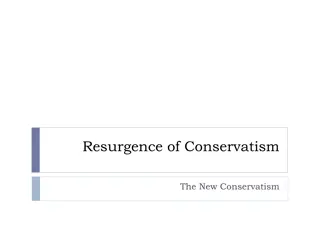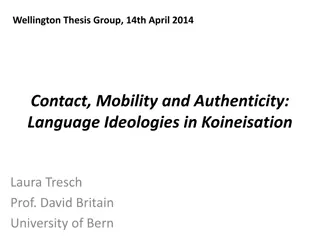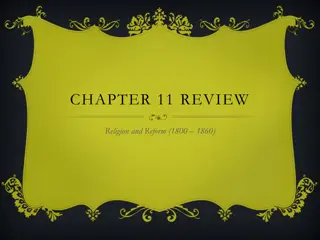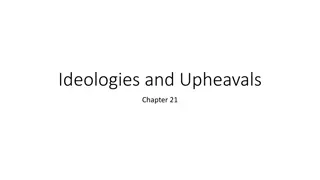Compare & Contrast
Similarities and differences in the ideologies of Thomas Hobbes and John Locke, focusing on their views on the state of nature, social contract, and forms of government.
4 views • 8 slides
Comparative Education and its Scope
The discipline of Comparative Education, its scope, and its impact on educational systems worldwide. Analyze different perspectives, geographical units, ideologies, themes, and historical development.
10 views • 6 slides
The All India Hindu Mahasabha: History and Impact
The All India Hindu Mahasabha is a right-wing Hindu nationalist political party in India formed to protect Hindu community rights. Despite being old, it has had marginal influence on politics. The Mahasabha emphasized Hindu solidarity and social reform, founded in the early 1900s by leaders like Pan
2 views • 11 slides
Angela Carter and Her Influential Works: A Contextual Analysis
Angela Carter, an English novelist known for her feminist and magical realism works, was influenced by her personal experiences and feminist ideologies. Her notable works include "The Bloody Chamber" and "The Sadeian Woman and the Ideology of Pornography". Carter's unique perspective on women's role
1 views • 26 slides
Understanding Sovereign Citizens: Beliefs and Practices
Sovereign citizens hold unconventional beliefs about government and law, leading to practices like rejecting licenses and using unique legal language. David Wynn Miller, a prominent figure in this movement, has influenced their ideologies. This group's actions can create challenges and legal conflic
3 views • 10 slides
Exploring Nationalism, Universalism, and Secularism in Education: Insights from Tagore and Krishnamurty
Delve into the profound concepts of nationalism, universalism, and secularism in education as elucidated by Dr. V. Regina, Principal at CSI Bishop Newbigin College of Education. The content explores the meanings, philosophies, and celebrations associated with these ideologies, drawing perspectives f
0 views • 22 slides
Approaches to the study of Human Rights
The Marxist perspective on human rights emphasizes social rights over individual rights, viewing the full realization of self within society. Marx connects bourgeois society with human rights, highlighting how exploitation under capitalism alienates individuals. In contrast, the Third World perspect
5 views • 19 slides
Stimulating Growth Who? How
Delve into the strategic challenges faced in stimulating economic growth, including responses to inflation, competition from China, strategic autonomy implications, Europe's technology deficit, aging economy dynamics, and the role of the state in enabling growth. Explore calls for EU public investme
1 views • 7 slides
Characteristics of Fascism: A Detailed Examination
This detailed examination delves into the key characteristics of fascism, outlining how fascist regimes wield powerful nationalism, disregard human rights, identify enemies for unification, prioritize military supremacy, promote widespread sexism, control mass media, obsess over national security, a
1 views • 16 slides
Understanding Critical Stylistics: Tools and Application
Critical Stylistics (CS) is a method that delves into the ideological underpinnings of texts through the analysis of linguistic features. Developed by Jeffries, CS focuses on uncovering implicit ideologies embedded in texts by examining stylistic choices. By integrating stylistics and critical disco
2 views • 28 slides
The Origins of the Cold War and U.S.-Soviet Antagonism
Amid post-World War II developments and contrasting ideologies, the Cold War emerged, marked by Yalta and Potsdam Conferences, the Truman Doctrine, the Marshall Plan, the Berlin Blockade, NATO's formation, and more. Various perspectives exist on the roots of U.S.-Soviet tensions, with the Soviet vis
1 views • 16 slides
Phases of the North-South Question and Social Democracy Evolution
Explore the evolution of Social Democracy in relation to the North-South question through seven phases outlined by Olle Törnquist. The discussion spans from the 1930s to modern times, highlighting shifts in international cooperation, economic ideologies, and political conditions that have influence
0 views • 10 slides
Walt Whitman Rostow's Model of Economic Growth - A Historical Perspective
Walt Whitman Rostow, an economist, proposed the Stages of Economic Growth theory in 1960, outlining the five stages through which countries pass to achieve economic development. His model reflects Western capitalist ideologies and was influenced by Cold War politics. Rostow's theory aimed to guide d
0 views • 19 slides
Understanding the Political Spectrum and Ideologies
Explore the political spectrum, ideologies, and the role of government in society. Learn about the differences between the left and right, economic vs social issues, and the debate surrounding traditions and societal change. Dive into discussions on government services, taxes, traditions, and societ
0 views • 15 slides
Mahatma Gandhi and His Ideology in Indian History
Mahatma Gandhi, a pivotal figure in India's freedom struggle, advocated for non-violence, truth, and self-realization. He reshaped the Indian National Congress and empowered the masses to fight against injustice through civil disobedience. Gandhi's ideologies of swadeshi, local democracy, and truste
0 views • 28 slides
Ancient Heterodoxies: Buddhism and Other Radical Ideas in the 6th to 4th Centuries BCE
Explore the Age of Heterodoxies in the 6th to 4th Centuries BCE, focusing on Buddhism, Jainism, and other radical ideologies challenging orthodox beliefs. Learn about the key figures like Buddha and Mahavira, their teachings, and the societal implications of these heterodoxies. Uncover how these ide
1 views • 16 slides
Enlightenment Thinkers and Their Ideals
The Age of Revolution was marked by influential Enlightenment thinkers such as Thomas Hobbes, John Locke, Montesquieu, and Jean-Jacques Rousseau. These philosophers explored human nature, government, and society, shaping modern political thought. Hobbes emphasized a pessimistic view, advocating for
2 views • 9 slides
Revolutionaries Throughout History: From Lenin to George Washington
Explore the lives and ideologies of influential revolutionaries such as Lenin, Che Guevara, Nelson Mandela, Gandhi, and George Washington. Dive into their causes, ideologies, use of violence, and desire for change, drawing parallels between them and assessing their impact on history.
0 views • 16 slides
Queer Temporalities and Resistance in Contemporary Society
Explore the concept of queer temporalities and resistance in the modern world through discussions on rewiring senses of time, challenging heteronormative ideologies, and embracing non-linear narratives. Delve into the complexities of age, body, and cultural perceptions of time as they relate to indi
1 views • 12 slides
Insights into Manik Bandopadhyay’s Works and Ideologies
Manik Bandopadhyay, an eminent Indian writer, delved into the complexities of human psyche and societal issues in his novels and short stories. Influenced by Marxist philosophy and Freudian principles, he portrayed ordinary individuals enduring extraordinary circumstances during the colonial era. Hi
4 views • 11 slides
Discursive Construction of Legitimation: Understanding Authority and Ideology
Systems of authority aim to establish legitimacy through discourses. Legitimation involves self-orientation, justification, and the imposition of ideologies. This practice encompasses various principles and categories such as moral evaluation, rationalization, and multimodal approaches, shaping soci
1 views • 36 slides
Critiques of Modernity and Liberal Ideology: Marcuse and Habermas
Herbert Marcuse's concept of One-Dimensional Man critiques capitalism's impact on human freedom and alienation in Western society. Marcuse emphasizes awakening individuals to their alienation to ignite their urge for freedom. Jurgen Habermas, in contrast, focuses on rational critique rooted in human
1 views • 5 slides
Overview of Political Ideologies
Explore various political ideologies ranging from individualism to communism, each with distinct beliefs on government intervention, economic policies, and social structures. From libertarianism to fascism, understand the core principles and characteristics that define these ideologies.
0 views • 8 slides
State-Sponsored Interreligious Dialogue in the Middle East: A Political Analysis
This research delves into the growth of state-sponsored interreligious dialogue initiatives in the Middle East between 2000-2020. It explores the political significance, impact on relations between political and religious authorities, and implications for religious practices in the region. The thesi
0 views • 23 slides
Impact of Dominant Ideas on Electoral Performance: A Comparative Analysis of Thatcherism and New Labour's Third Way
Examining the influence of dominant ideas on electoral success, this essay delves into the contrasting ideologies of Thatcherism and New Labour's Third Way within British politics. By scrutinizing their economic decisions, foreign policies, and overall governance, the essay analyzes how these ideolo
0 views • 8 slides
Critical Thinking in Islamic Methodology
Explore the concept of critical thinking in Islam, identifying key skills and understanding the importance of constructive criticism. Delve into the methodology of thinking in Islam that transcends superficial understanding, enabling individuals to distinguish between good and bad, correct and incor
2 views • 12 slides
Understanding Fundamental Principles of Public Finance
Public Financial Management involves the management of public funds, focusing on goals, objectives, and ideologies shaping government functions. Concepts such as laissez-faire and socialism influence how governments provide services, enforce laws, protect private interests, and promote social welfar
0 views • 86 slides
Perspectives on Recreation and Physical Activities Across Cultures and Genders
Ideologies, beliefs, and world views shape how different cultures and genders approach recreation and physical activities. In Eastern cultures, martial arts and spiritual practices like yoga hold significance, while in Western cultures, sports are often viewed as a business opportunity. South Africa
0 views • 13 slides
Understanding Mixed Economy: A Balanced Economic Model
Mixed economy combines elements of socialism and capitalism, allowing both public and private sectors to coexist. Government intervention aims to achieve a balance between individual initiatives and societal goals, promoting economic development while addressing inequalities. Features include econom
0 views • 15 slides
Understanding Language Ideologies in Writing Education
Exploring the debate on whether writers should use their own English or conform to standard language rules, this content delves into the perspectives of Stanley Fish and Vershawn Ashanti Young. Fish argues for teaching standard English to avoid prejudice, while Young critiques this view, advocating
1 views • 17 slides
Applying the NSPE Code of Ethics to Re-Opening University Campuses
Explore the importance of engineering codes of ethics, delve into the NSPE Code of Ethics, and examine ethical challenges in re-opening university campuses amid a pandemic. Gain insights into managerial competence, ideologies, and ethical decision-making in the engineering field.
0 views • 33 slides
Rise of Fascism: Impact on European Governments
Explore the rise of fascism in Europe following the Great Depression, as people turned to extreme forms of government for economic recovery and national pride. The emergence of fascist ideologies, authoritarian leaders, and the shift away from democratic systems are examined in relation to the histo
0 views • 12 slides
Quality Educational Assessment: The Spicing of Educational Reformation by Dr. Chiwiye Timothy
Dr. Chiwiye Timothy delves into the landscape of educational reform, highlighting the diverse ideologies that shape the field. He discusses the resistance to change, the pitfalls of radical reform, and advocates for a needs-driven approach rooted in feasibility studies. Through innovative ideas and
6 views • 14 slides
Understanding Ideology and Society: Perspectives and Beliefs
Explore the significance of ideology in shaping societal perspectives, beliefs, and values. Understand the impact of ideologies on laws, societal structures, and individual behavior. Delve into concepts such as liberalism, individualism, and collectivism to gain insights into human societies through
4 views • 26 slides
Understanding Factors Influencing Support for Terrorist Ideologies
Staff members should possess knowledge on factors driving people towards terrorist ideologies. The Prevent Strategy aims to combat extremism and prevent individuals from engaging in terrorist activities through promoting partnerships and upholding British values. However, challenges such as lack of
0 views • 43 slides
Understanding Political Ideologies: Liberalism and Conservatism Explained
Political ideologies shape beliefs about the role of government and societal balance between the public and private sectors. Liberalism focuses on individual liberty and government intervention for equality, while conservatism emphasizes limited government, traditional values, and free markets. Psyc
0 views • 25 slides
The Resurgence of Conservatism in America
The resurgence of conservatism in America has brought about a clear distinction between conservative and liberal ideologies. Conservatives emphasize limited government intervention, promoting free-market principles, individual liberty, and moral values. On the other hand, liberals advocate for gover
0 views • 14 slides
Language Ideologies in Dialect Contact Situations
The study explores how language ideologies influence the legitimacy and status of different dialect varieties in contact situations. It delves into the construction of power relations, social sameness and difference, and cultural stereotypes through language use. Key concepts such as language ideolo
0 views • 28 slides
Religion and Reform: 19th Century Ideologies and Movements
Explore the influence of individualism through transcendentalism, rural communalism, and urban popular culture in the 1800s. Delve into the ideologies of Ralph Waldo Emerson, Henry David Thoreau, Margaret Fuller, and Walt Whitman. Learn about utopian societies, the Mormon experience, and nativist mo
0 views • 15 slides
Ideologies and Upheavals: Congress of Vienna and Impact
The Congress of Vienna, a gathering of key European powers, aimed to establish lasting peace after Napoleon's defeat. Key agreements included territorial compensation, restoration of monarchs, and the formation of the Holy Alliance. While successful in preventing major wars, the Congress lacked fore
0 views • 19 slides

